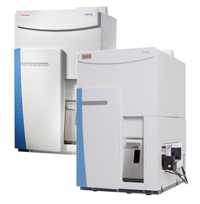Inductively coupled plasma mass spectrometry (ICP-MS) is a key technology for trace elements in routine focused laboratories. The determination of trace elements is regulated in a number of sample matrices, including drinking waters (EPA method 200.8 and ISO method 17294), waste waters (EPA method 6020B), foodstuffs (AOAC method 2015.01) and pharmaceutical products (United States Pharmacopeia chapters <232> and <233>).
 In many cases, contract laboratories are key players to turn over the large amount of samples coming through from smaller and mid-size municipalities (unable to perform cost-efficient testing themselves), or companies that do not want to operate specialized laboratories with lower sample throughput. Contract laboratories can, therefore, offer cost-efficient analysis through higher numbers of samples, and specialize to offer dedicated solutions for key requirements. Consequently, contract laboratories have a stringent demand set on analytical instruments, allowing them to be highly cost efficient, through minimized sample turnover times, and maximized system uptime. This again is facilitated by the instrument manufacturers through intelligent solutions for sample handling, instrument performance and reduced maintenance requirements in routine operation.
In many cases, contract laboratories are key players to turn over the large amount of samples coming through from smaller and mid-size municipalities (unable to perform cost-efficient testing themselves), or companies that do not want to operate specialized laboratories with lower sample throughput. Contract laboratories can, therefore, offer cost-efficient analysis through higher numbers of samples, and specialize to offer dedicated solutions for key requirements. Consequently, contract laboratories have a stringent demand set on analytical instruments, allowing them to be highly cost efficient, through minimized sample turnover times, and maximized system uptime. This again is facilitated by the instrument manufacturers through intelligent solutions for sample handling, instrument performance and reduced maintenance requirements in routine operation.
New technology, such as triple quadrupole ICP-MS is key to overcoming challenges including unexpected interferences requiring post-analysis assessment of the data and labour intensive subsequent re-runs.
 Separation Science, in collaboration with Thermo Fisher Scientific, is offering a webinar that will demonstrate how modern ICP-MS instruments, such as the Thermo ScientificTM iCAPTM RQ ICP-MS and Thermo ScientificTM iCAPTM TQ ICP-MS, can help to solve the above mentioned challenges. The presentation, given by Richard Jack and Daniel Kutscher, will also show how key metrics including turnover time per sample or maintenance required downtime can be reduced without compromising system performance.
Separation Science, in collaboration with Thermo Fisher Scientific, is offering a webinar that will demonstrate how modern ICP-MS instruments, such as the Thermo ScientificTM iCAPTM RQ ICP-MS and Thermo ScientificTM iCAPTM TQ ICP-MS, can help to solve the above mentioned challenges. The presentation, given by Richard Jack and Daniel Kutscher, will also show how key metrics including turnover time per sample or maintenance required downtime can be reduced without compromising system performance.
The aims of the presentation are to allow you to:
- get to know new solutions to increase sample throughput, overcome interferences more efficiently, and reduce the system downtime through care and maintenance
- reduce the number of re-runs, by getting quality results first time
- learn how easy it is using modern software tools to integrate improved technology for sampling and analysis into your laboratory and reach another level of analytical possibilities
- find out how your laboratory will benefit from upgrading to triple quadrupole ICP-MS routine analysis with no obstacles for your operators
If you'd like to register to attend this free-access on-demand event, click on the button below...




